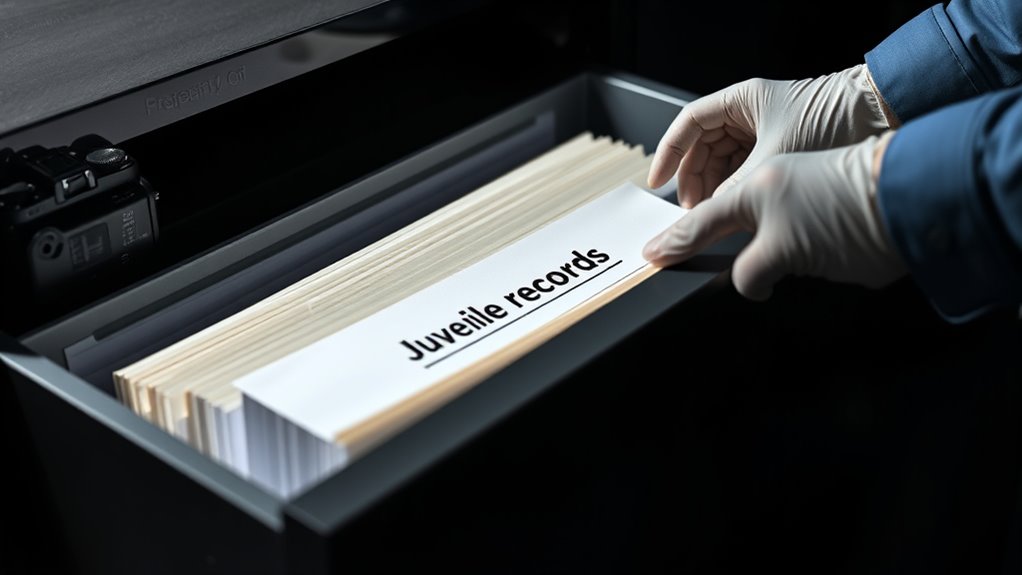When accessing juvenile records, you must respect strict legal and ethical boundaries designed to protect minors’ privacy. Laws keep these records confidential, often sealing them or restricting access to authorized parties only, like parents or legal officials. You need a court order or a valid reason, and attempts to bypass these rules can lead to legal penalties. Understanding these restrictions helps ensure you stay compliant; exploring further reveals more about safeguarding juvenile privacy rights.
Key Takeaways
- Juvenile records are protected by confidentiality and privacy laws, limiting access to authorized parties only.
- Requests for records require a formal process, such as court approval, and must demonstrate a legitimate need.
- Unauthorized disclosure can lead to legal penalties and violates minors’ privacy rights.
- Access is generally restricted to parents, legal representatives, or certain agencies, not the public.
- Legal and ethical standards emphasize safeguarding minors’ confidentiality to support rehabilitation and prevent harm.

Are you wondering how to access juvenile records? If so, it’s vital to understand that these records are generally protected by strict confidentiality concerns and privacy rights. Juvenile records often contain sensitive information about minors, and accessing them isn’t as straightforward as requesting adult criminal records. Instead, there are legal and ethical boundaries designed to protect the privacy of young individuals, and you need to navigate these carefully.
Juvenile records are protected by confidentiality and privacy laws to safeguard minors’ sensitive information.
The primary consideration is that juvenile records are typically sealed or restricted to prevent undue harm or stigma to the minor involved. Courts and agencies prioritize confidentiality concerns because revealing such information can have long-lasting effects on a juvenile’s future, including employment opportunities and social reputation. As a result, access is limited to authorized parties, such as parents, legal representatives, or certain government agencies, and even then, often requires a formal request or court order.
Privacy rights are at the core of these restrictions. Juvenile offenders have a right to privacy that adults do not enjoy, recognizing that minors are still developing and may be more vulnerable to the consequences of public disclosure. When requesting juvenile records, you must demonstrate a legitimate interest or legal need—such as a defense in a legal case, custody disputes, or other authorized proceedings. Simply wanting to view records out of curiosity isn’t enough and could violate privacy rights and confidentiality concerns.
In many jurisdictions, you’ll need to file a formal petition or application with the appropriate juvenile court or agency, providing valid reasons for your request. The court then evaluates whether releasing the records aligns with the best interests of the juvenile and public safety. If the court approves your request, access may be granted under strict conditions, often limited to specific information rather than the entire record.
It’s essential to respect these legal boundaries, even if you believe you have a valid reason to access juvenile records. Unauthorized disclosure or attempts to bypass confidentiality protections can lead to legal penalties and violate privacy rights. Remember, these laws exist not only to protect minors’ privacy but also to foster their rehabilitation and prevent unnecessary stigma. Always consult legal professionals or court officials before attempting to access juvenile records, and be prepared to justify your request within the framework of confidentiality and privacy laws. Doing so ensures you uphold ethical standards while respecting the delicate balance between transparency and safeguarding young individuals’ rights. Additionally, understanding the importance of confidentiality concerns helps maintain the integrity of juvenile justice processes and supports the best interests of minors involved.
Frequently Asked Questions
Can Juvenile Records Ever Be Permanently Sealed or Destroyed?
You might wonder if juvenile records can be permanently sealed or destroyed. Generally, record sealing is possible after a certain period or under specific conditions, helping your record become private. Record destruction, however, is less common and usually only granted in exceptional cases. You should check your state’s laws, as they determine eligibility for sealing or destruction, giving you a fresh start and protecting your privacy.
Are There Specific Circumstances That Automatically Allow Access to Juvenile Records?
When it comes to accessing juvenile records, certain circumstances automatically allow access, especially where confidentiality exceptions or parental rights are involved. You should know that courts often grant access if it’s in the best interest of the child, for legal proceedings, or if parental rights are involved. These situations override usual confidentiality rules, emphasizing the importance of understanding legal boundaries and respecting privacy while ensuring appropriate access when necessary.
How Do Privacy Laws Vary Between States Regarding Juvenile Record Access?
You should understand that state regulations vary widely when it comes to juvenile record access. Some states have strict privacy exemptions, making records highly restricted, while others allow more open access under specific circumstances. It’s essential to research your state’s laws, as these regulations determine who can view juvenile records and when. Always guarantee you’re compliant with local laws to respect privacy rights and avoid legal issues.
What Are the Potential Legal Consequences of Unlawfully Accessing Juvenile Records?
If you unlawfully access juvenile records, you risk serious legal repercussions, including fines, criminal charges, or even loss of your license. Such actions also constitute ethical violations, damaging your professional reputation and potentially leading to disciplinary actions. You must comprehend that violating laws protecting juvenile privacy not only harms individuals but also exposes you to long-term legal and ethical consequences. Always guarantee you follow proper procedures and legal guidelines.
Can Juvenile Records Be Accessed by International Organizations or Foreign Authorities?
Sure, international organizations and foreign authorities can access juvenile records—if they follow international cooperation and data sharing protocols. But don’t get too excited; most countries have strict rules protecting juvenile privacy. They usually require legal justification and adherence to confidentiality laws. So, unless your international friends are willing to jump through hoops, accessing juvenile records across borders remains a tricky, tightly guarded process—designed more for compliance than espionage.
Conclusion
In maneuvering the complex terrain of juvenile records, you must remember that respecting privacy isn’t just a moral choice—it’s the law. As you weigh the ethical and legal boundaries, think of it like handling a precious vintage vinyl; you handle with care and discernment. Remember, in today’s digital age, transparency and confidentiality are your guiding stars. By respecting these boundaries, you ensure fairness and integrity, much like a true knight of modern justice.








